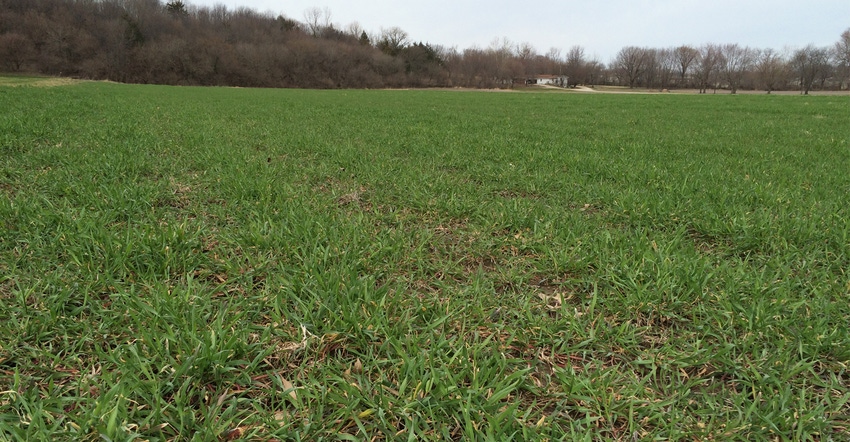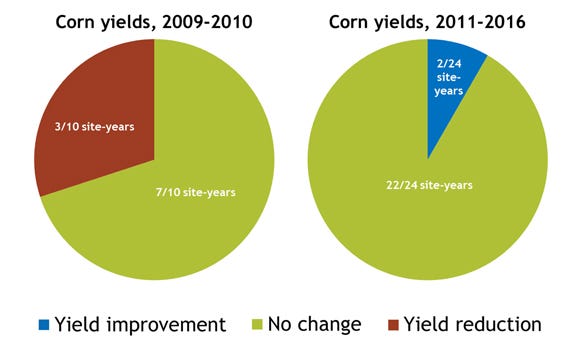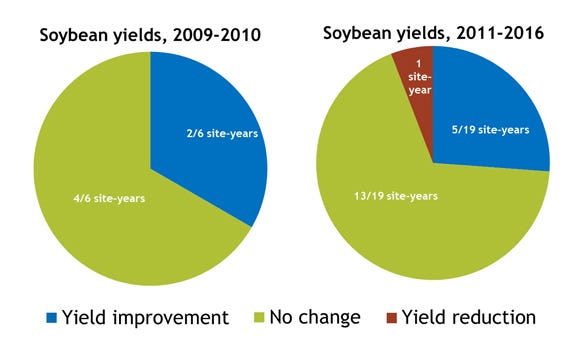February 13, 2017

By Liz Juchems
In the early 2000s, cover crops began to appear more frequently on field day agendas due to their many benefits, including reducing soil erosion, building soil health, encouraging water infiltration and improving water quality. One of the commonly asked questions was what impact cover crops have on corn and soybean yield. The pursuit for an answer created the Iowa Cover Crop Working Group (ICCWG) and the longest running on-farm cover crop research and demonstration project in Iowa.
In partnership with 12 farmers across the state, the on-farm cover crop demonstration sites were established in 2008 and 2009. The sites were in Shelby, Adair, Butler, Greene, Grundy, Guthrie, Ida, Tama, Taylor, Washington (two farmer-partners) and Webster counties. Six of the sites have continued on in the project, completing year eight of the study in 2016.
What farmers have learned
Each site has randomized, replicated strips with and without cereal rye cover crops within a no-till corn-soybean cropping system. Working with each producer and their existing crop management plan, the strips are seeded aerially before harvest or drilled after harvest at 56 to 60 pounds per acre. The rye cover crop is terminated each spring by herbicide one to two weeks before planting and aboveground biomass samples are collected near the time of termination. Using weigh wagons and yield monitors, corn and soybean yields are collected each fall in the strips with and without a cereal rye cover crop.
Since 2008, there have been 34 site-years dedicated to determining the cereal rye cover crop’s effect on corn yields and 25 site-years to determine its effect on soybean yields. When properly managed, cereal rye cover crops added to a corn-soybean rotation have had little to no negative effect on yield and have actually increased soybean yields in seven site-years and corn yield in two site-years.

Farmers identified insufficient cover crop termination and improper planter settings as reasons for the corn yield reductions in the learning years of 2009-10.

Management is key when incorporating cover crops into a corn-soybean rotation. Knowing what cover crop to use, when to plant, and how and when to terminate are the main components to successful implementation. Effective termination with herbicide requires an actively growing plant, and planter settings may also need to be adjusted to handle increased residue.
When the project began, the farmers were concerned that the winter cereal rye would impact their corn or soybean yields negatively. But after harvest was completed each year, the farmers reported that this was not the case.
Better soil quality, better yields
“Over the past eight years, my initial concerns have been proven wrong with stronger yields and better soil quality,” says Butler County farmer Rick Juchems of his experiences in the project. “A new benefit I’m now seeing is suppression of weeds, especially ahead of soybeans when the rye is terminated later in the spring.” Juchems’ corn yields have remained steady, and he has seen a slight improvement in soybean yields.

Planter settings were identified as the reason for reduced soybean yield in one site-year following the rye cover crop.

For more cover crop research information and the “Winter Cereal Rye Cover Crop Effect on Cash Crop Yield – Year 8” publication, visit iowalearningfarms.org.
The ICCWG includes members from the following agencies and organizations: ILF, Practical Farmers of Iowa, Iowa State University Extension, USDA Ag Research Service’s National Laboratory for Agriculture & Environment, Leopold Center for Sustainable Agriculture, Iowa Department of Agriculture and Land Stewardship, and USDA Natural Resources Conservation Service.
Juchems is events coordinator with Iowa Learning Farms. ILF is building a culture of conservation and calling attention to the importance of water and soil quality through conservation farming practices.
You May Also Like




